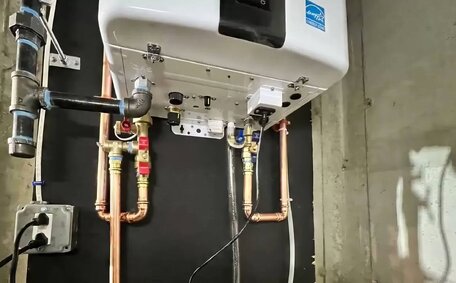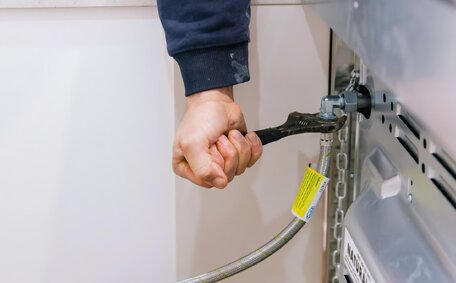Introduction to Construction Debris Causing Drain Blockages
Construction debris not properly disposed of can clog drains, leading to significant blockages.
Pieces of wood, drywall, concrete, nails, and various other materials often end up on the ground during construction. Heavy rains can wash construction remnants and debris down into street gutters and connected sewer lines, risking blockages.
Debris can accumulate at bends and junctions in sewer drains, causing blockages. Accumulated materials can restrict water flow by narrowing the drain’s pathway within the pipes. Blocked drains can escalate into severe clogs, especially if tree roots invade the pipes, requiring urgent action to prevent backups and overflows inside the home.
In Minchinbury, Sydney, our ageing sewer system is under strain, necessitating professional plumbing services for potential tree root infiltrations and pipe deterioration. Construction rubbish can exacerbate existing plumbing issues, potentially leading to significant problems that demand professional resolution.
As both homeowners and builders carry out projects large and small across our region, It’s essential to emphasise proper cleanup and containment of construction debris. Proper waste sorting and removal prevent the inconvenience and costs associated with burst pipes and flooding.
We will discuss common construction-related causes of drain blockages and the best practices to prevent them.
Common Causes of Drain Blockages During Construction
Construction debris from materials, tools, and equipment can stress pipe networks if precautions are neglected. Common contributors to drain blockages at Minchinbury construction sites include:
- Wood shavings and sawdust from cutting lumber and structural framing
- Nails, screws, bolts, and other metal hardware
- Drywall mud, joint compound, plaster, and stucco
- Concrete, gravel, and rebar fragments
- Plastic, metal, and glass shards from packaging and containers
- Painter’s cloths, drop cloths, masking papers, and more
Rainfall or spills can wash or dump assorted rubble into drains and fixtures, causing blockages. Debris buildup over time, especially in old or narrow pipes, can lead to significant clogs.
Toilet drains also frequently become blocked by foreign objects when construction crews carelessly discard items like toilet paper, cigars, and food waste, causing toilet water flow issues. Workers may resort to makeshift solutions that risk blockages, with items improperly disposed of in toilets or sinks, overwhelming the plumbing system.
With a tidy site, established waste collection points, filters or traps in place, and storm drains secured during the work, you can clear your plumbing from blockages, allowing materials to break down safely away from your system.
Accidental sewer blockages, such as food scraps entering the system, require vigilance for signs like gurgling noises, overflows, or slow drainage. A quick decision to call a professional plumber, as soon as you notice your blocked drains issues coming your way can help nip more serious pipe backups and floods in the bud.
Improper Installation of Pipes
Improperly installed pipes can create gateways where tree roots can invade and buildup over time, leading to major drainage problems down the line. Some key issues that can cause blockage include:
- Horizontal pipes need a precise slope to ensure water flow, descending at least 20mm for each metre towards the main sewer. Failure to achieve adequate downhill slope will cause stagnant water accumulation and recurrent clogs.
- Unsecured pipe segments. Drainage pipes your home contains can become problems if not firmly anchored with couplings to prevent sagging, misalignment, and disconnected joints when materials are carelessly placed down. If detachments occur, loose debris and root infiltration can obstruct flow.
- Imperfect sealant application on joints or a leaky faucet allow water seepage into surrounding soil, thus leading to erosion under foundations, and creating entry points for tree roots. Poor application of solvent cement, glue, epoxy resin, o-ring gaskets during assembly leads to leaks.
- Sharp bends without cleanouts can be problematic as debris can easily accumulate where a change in direction may be inevitable. Such sharp turns impede flow and readily catch debris.
Inadequate measurement, securing, sealing, or maintenance access during installation can severely compromise drainage capacity. Attention to detail prevents improper installation issues from causing chronic drain blockages and waterlogging throughout the property.
Accumulation of Construction Debris
Construction sites generate a lot of debris that can easily accumulate if not disposed of properly. Here are some common materials that pile up:
- Wood shavings and sawdust
- Scrap metal pieces
- Drywall compound residue
- Discarded fasteners and hardware
- Electrical cuttings and conduit fragments
- Concrete, brick, and masonry rubble
- Tile remnant and grout waste
- Torn plastics and solvent containers
This debris, a common cause of blocked drains, typically gathers in piles around the perimeter of sites, gets trampled into muddy trenches, or blown against temporary fencing and scaffolding, making its way down into the drain system. Storm water can then pick up these strewn materials and have them washed down drain towards street gutters, culverts, and drains.
Here in Sydney, construction codes mandate proper waste sorting and removal practises, and here some guidelines to follow. However, understanding how fix the pace of work and complex multi-stage projects make construction clutter a common challenge is essential. Clear debris collection zones, covered waste piles, and sealed-off storm drains prevent blocked stormwater from entering the drainage infrastructure during construction, averting potential overspills.
For homeowners renovating properties in Minchinbury, consulting your plumber to take measures to avoid materials such as oil grease from construction escaping down the sink can save both money and unnecessary headaches. Any accumulated gunk that enters ageing sewer lines ultimately might lead to a plumbing emergency, necessitating actions like rodding, hydrojetting, or even pipe relining to restore flow.
Preventing Drain Blockages in New Home Construction
When building a new home, implement the following measures during construction to avoid future drain blockages:
- Use heavy-duty drain inlet filters. Install filters over bathtub, shower, and faucets your house features to catch debris and forestall it from journeying into pipe.
- Inspect and clean drains weekly. Hire contractors to hydrojet drains before connecting to main sewer lines to remove any accumulated debris.
- Keep construction waste neat and contained. Designate protected waste sorting zones on-site and cover debris piles to avoid stormwater contamination.
- Seal off street gutters and your stormwater drains. Prevent runoff entry points into the drainage system until landscaping completion.
- Install hair catchers. Place hair catchers over tub and sink fixtures to minimise risks from shedding and debris contamination during finishing.
- Educate homeowners and tenants. Inform new occupants of steps to avoid pouring grease fat oil and disposing solids down drains to maintain flow.
- Use quality drainage materials. Choose corrosion-resistant pipes, durable joints, smooth bends, and optimal slope measurements for long-term reliability.
Integrating preventative strategies such as regular drain maintenance during home construction can lead to significant cost savings and reduced issues. This proactive approach minimises health hazards from sewer gases and contamination risks from pipe leaks or overflows over the entire occupant lifetime.
Signs of Early Drain Blockage
Early detection of blockages from materials like grease and fat is vital to prevent major pipe backups and damage. Be on guard for these subtle early signals of potential issues in Minchinbury drains, which can do much to foretell more significant blockage problems:
- Gurgling sounds from sinks/tubs when water drains
- Water pooling around floor drains after use, which may indicate a burgeoning plumbing problem
- Your toilet suddenly taking longer to refill
- Foul sewer gas smells around drains
- Bathtubs taking longer to empty
- Outdoor drains overflowing in heavy rain
These problems typically start small but a blockage can rapidly escalate if deposits like soap scum accumulate and impede flow. A buildup of silt, grime, hair soap residue, and other gunk usually precedes full blockages.
By spotting issues promptly, homeowners can attempt simple drain cleaning solutions like pouring hot water, baking soda, and vinegar, before seeking out professional hydrojetting or rodding services. Acting at the first gurgle saves time, money, and damage.
Yet, when comes to pooling water around drains or toilets that won’t flush, immediately call us; your Minchinbury emergency plumbers. We locate clogs fast with camera inspection and resolve backup risks with powerful tools, including the efficient drain snake and Ozeflow electric drain machines. Acting swiftly is the key to a great job in managing potential flooding disasters!
The Impact of Blocked Drains
Blocked drains can have severe consequences if left unattended, including:
- Sewage back ups and foul odours inside your house due to a blocked drain your pipes being overloaded with wastewater and unable to drain properly.
- Flooding damage to your property can occur as water pools around affected drains and eventually overflows onto floors and walls, which can be a warning sign of underlying issues.
- Sinkholes forming as water leaks wash away supporting soil surrounding blocked and leaking underground pipes.
- Groundwater contamination can cause environmental damage when sewage leaks out of broken pipes into surrounding soil and aquifers.
- Roots and insects infesting damaged drains, complicating future repair work.
- Voided warranties and lack of recourse on new construction due to negligence in allowing debris-related blockages during building.
- Steady property damage and mould growth as dampness spreads through foundations and walls.
Early detection and resolution of blocked drain issues we would get ahead of costly setbacks. Yet, proactively addressing complex blockages, a practice we would absolutely endorse, still outweighs the misfortune of enduring ongoing backups. Our Minchinbury plumbers combine mechanical rodding equipment and high-pressure water jetting to clear even formidable obstructions while inspecting drain integrity in your home.
By renewing flow and function, I would highly recommend your local plumber to mitigate immediate overflow threats and map underlying issues needing long-term repair. Whether recent debris or underlying pipe collapses, our rigorous approach protects homes against the structural, health, and financial impacts of blocked drains.
Professional Drain Cleaning Services
As a leading plumbing provider in Minchinbury, we highly recommend contacting professional drain cleaners to keep construction sites and properties free of debris-related blockages.
Our skilled technicians promptly employ advanced hydrojetting equipment to power-wash drains and remove obstructions within the pipes. This efficient process not only clears out common contributors to sewer pipes woes such as mud, silt, and rocks but also means everything gets cleaned up after, right down to the sand and other sediment accrued during the building project.
We also perform thorough inspections with specialised CCTV cameras that can even detect issues with your water heater and assess your sewer pipe integrity following hydrojetting. Any issues like cracks, blockages from tree roots or joint displacements get documented for recommended repair.
By partnering with us for scheduled maintenance of new construction drainage systems, builders ensure that any accidental debris build up gets cleared swiftly, preventing the need for major interventions should problems come out. We help establish optimal flow and function that lasts through occupant turnover.
Homeowners undertaking renovations likewise gain assurance that with our support, they can use high-powered hydrojetting interventions to reverse remodelling debris mishaps. We restore normal drainage rapidly, avoiding corrosion risks of prolonged blockages.
With 24/7 availability for emergency rodding and hydrojetting services in Minchinbury, we aim to contain mess and damage when unexpected drain calamities strike construction sites or households.
Our upfront pricing would highly competitive, and our team’s meticulous reporting along with responsive customer service take the stress out of construction-related plumbing disasters. Reach out, and our team will provide insights on leveraging professional plumbing services for your next building project.






